Russia shares common borders with 14 different countries. They are listed here for you to read in Russian. After reading this list, see if you can find them on a map. Which of these are former republics of the Soviet Union?
| Норвегия | Польша | Казахстан |
| Финляндия | Белоруссия | Китай |
| Эстония | Украина | Монголия |
| Латвия | Грузия | Северная Корея |
| Литва | Азербайджан |
Russia also borders on several large bodies of water. They are listed below:
| Балтийское море | Северный Ледовитый океан |
| Финский залив | Тихий океан |
| Чёрное море | Японское море |
| Азовское море | Охотское море |
| Каспийское море | Берингово море |
Using the compass points below, tell your instructor where the 14 nations andthe bodies of water are located:
| in the north | на севере |
| in the south | на юге |
| in the west | на западе |
| in the east | на востоке |
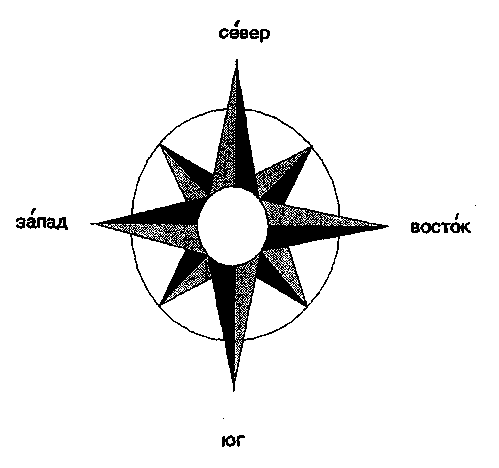
Russia is divided into a number of distinct areas, based on the geographic features of each region. Some of the most common of these are:
| Центральный район | Central (region) Russia |
| Урал | Ural Mountains |
| Поволжье | Volga River Valley |
| Сибирь | Siberia |
| Дальний Восток | Far East |
The following cities are located in these geographic areas:
| 1 | Москва в Центральном районе. | Moscow is in Central Russia. |
| 2 | Екатеринбург на Урале | Yekaterinburg is in the Urals. |
| 3 | Волгоград в Поволжье. | Volgograd is in the Volga River Valley. |
| 4 | Новосибирск в Сибири. | Novosibirsk is in Siberia. |
| 5 | Владивосток на Дальнем Востоке. | Vladivostok is in the Far East. |
See if you can locate these cities on the map shown here.
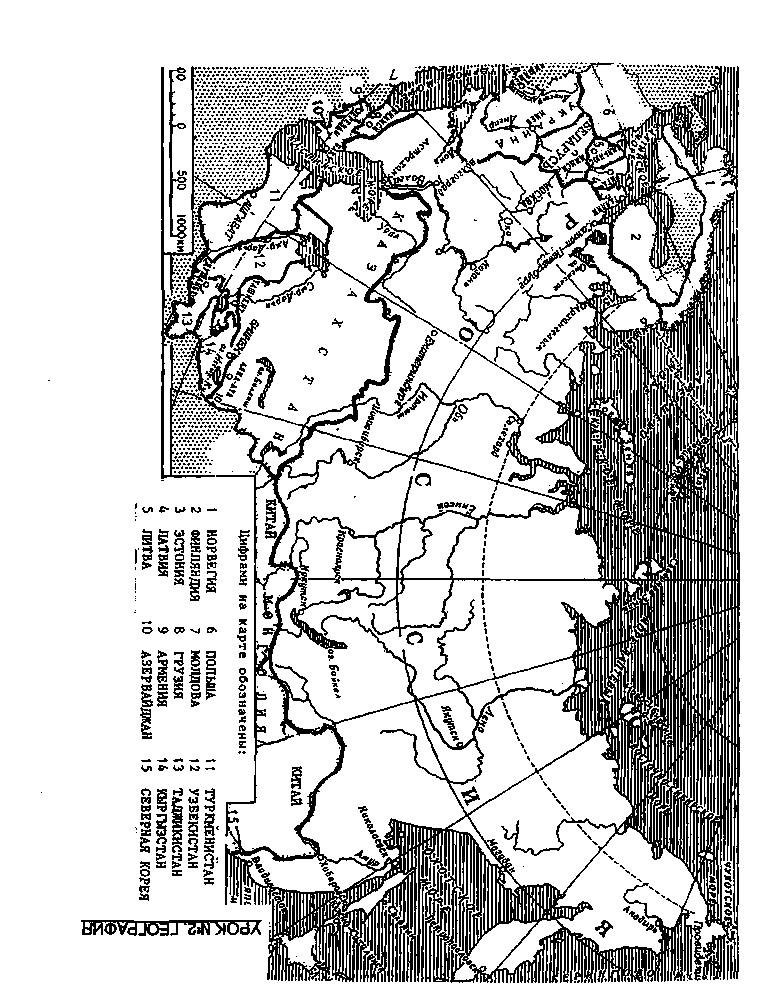 |
After August 1991, the names of many Russian cities were changed:
| Present | Former |
|---|---|
| Санкт-Петербург | Ленинград |
| Нижний Новгород | Горький |
| Екатеринбург | Свердловск |
| Тверь | Калинин |
| Сергиев Посад | Заго́рск |
The same is true of numerous locations and landmarks in Moscow and other Russian cities:
| Present | Former |
|---|---|
| Тверская | улица Горького |
| Новинский бульвар | улица Чайковского |
| Театральная площадь | площадь Свердлова |
| Лубянская площадь | площадь Дзержинского |
| Манежная площадь | площадь 50-летия Октября |
But "Red Square" is still Red Square!
Красная площадь has been called Красная (red) since the second half of the 17th century. The square was constructed towards the end of the 15th century (around the time of Columbus' discovery of America) when Tsar Ivan the Great Иван Великий was building the magnificent cathedrals of the Kremlin Кремль, that walled fortress which was the heart of the city's defenses. Every major city in Russia would have had a kremlin, but the Moscow one is by far the most famous.
The square was first called Торг (Trading Place) and was the site for some very lively commerce. Later, in the 16th century, it became known asТроицкая (Trinity Square) in honor of the Trinity Cathedral which stood at the southern end of the square. In 1571 the square was renamed Пожар (The Fire) after the great fire of that year. Finally, the square was named Красная when it was cleared of all the trading stalls at the end of the 17th century. At that time the word красный(red) meant красивый (beautiful), and had nothing to do with the red brick of the Kremlin wall which runs along one of its sides.
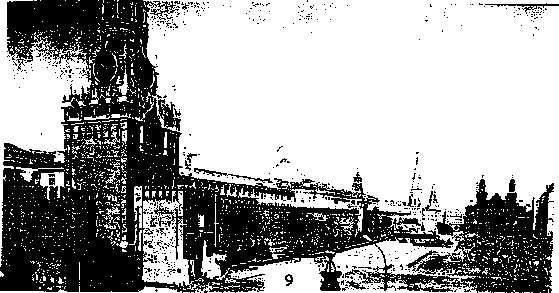 |
Listen to the sentences your instructor will read aloud and write down in English any place names you recognize
1. ____________________
2. ____________________
3. ____________________
4. ____________________
5. ____________________
6. ____________________
7. ____________________
Listen to the statements your instructor will read aloud and indicate whether they are true (T) or false (F)
| 1. ____________________ | 4. ____________________ | 7. ____________________ |
| 2. ____________________ | 5. ____________________ | |
| 3. ____________________ | 6. ____________________ |
Practice writing place names in Russian as your instructor reads them aloud. He/she will read each one twice and then will write them on the board so that you can check your work.
1. ____________________
2. ____________________
3.. ____________________
4. ____________________
5. ____________________
6. ____________________
7. ____________________
Answer the following questions according to the model.
| Instructor: | Москва - столица России? |
| Student: | Да, Москва - столица России. |
Осло - столица Норвегии?
Хельсинки - столица Финляндии?
Париж - столица Франции?
Бонн - столица Германии?
Варшава - столица Польши?
Оттава - столица Канады?
Вашингтон - столица Америки?
Лондон - столица Англии?
Мадрид - столица Испании?
Рим - столица Италии?
Answer the questions truthfully, according to the models:
| Instructor: | Париж - столица Франции? |
| Student: | Да, Париж - столица Франции. |
| Instructor: | Анкара - столица Индии? |
| Student: | Нет, Новый Дели - столица Индии. |
Токио - столица Китая? (Пекин)
Манила - столица Филиппин?
Мадрас - столица Индии? (Новый Дели)
Анкара - столица Ирана? (Тегеран)
Лондон - столица Англии?
Стокгольм - столица Швеции?
Афины - столица Греции?
Канберра - столица Австрии? (Вена)
Каир - столица Египта?
Аддис-Абеба - столица Эфиопии?
Тель-Авив - столица Израиля?
Рим - столица Итапии?
Мадрид - столица Португалии? (Лиссабон)
Гавана - столица Кубы?
Какой? is the question word which asks: "Which?". Listen carefully as your instructor asks:
Какой город столица Англии?
Which city is the capital of England?
You'll answer:
Лондон.
Continue, using the cities and countries given in Exercise 7. See how many you might be able to add on your own.
Что это? asks "What is this? What is that?" When answering, you'll begin your answer with Это... This is/That is...
Now your instructor will point to various cities on the map and will ask:
Что это? What is this? (pointing to Moscow)
You'll answer by naming the city, using this model:
Это Москва. That is Moscow.
Answer the following questions substituting the appropriate pronoun for the noun.
| Instructor | Где Москва? | Где Лондон? | Где Чёрное море? |
| Student | Вот она. | Вот он. | Вот оно. |
| A. | В. |
| Где Лондон? | Где Прага? |
| Где Париж? | Где Тирана? |
| Где Санкт-Петербург? | Где Москва? |
| Где Берлин? | Где София? |
| Где Мадрид? | Где Варшава? |
| Где Рим? | Где Вена? |
| Где Вашингтон? | Где Братислава? |
| Где город Токио? | Где Ялта? |
| Где город Осло? | Где Гаага? |
| С. | D. |
| Где Россия? | Где Каспийское море? |
| Где Канада? | Где Чёрное море? |
| Где Япония? | Где озеро Байкал? |
| Где Эфиопия? | Где Балтийское море? |
Take a look at the following advertisements. Pick out all words which are familiar to you. Any guesses as to what the ads are all about? Ask your instructor if you need help.
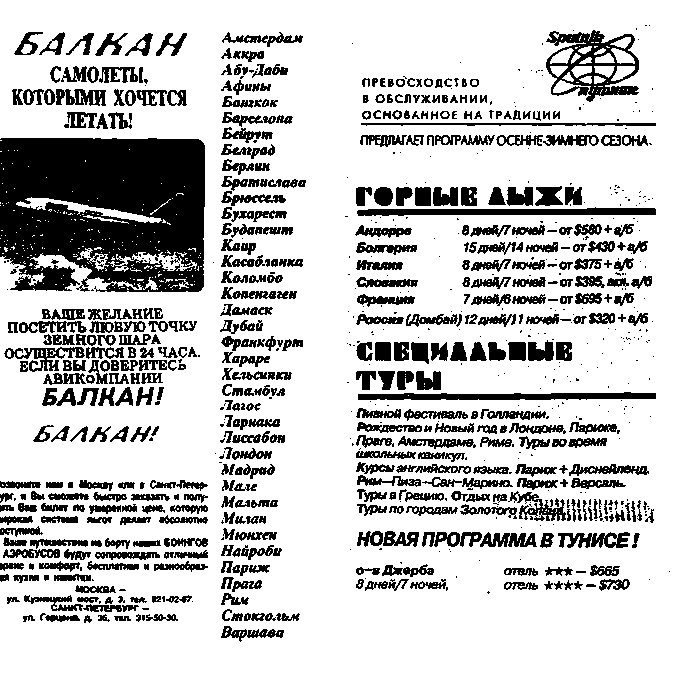 |
Your instructor wants you to show where various places are on the map. He/she will ask you:
Покажите...
Покажите Волгу.
Покажите Сибирь.
Покажите Тихий океан.
Покажите Финский залив.
Покажите Каспийское море.
Покажите Северный Ледовитый океан.
Покажите Чёрное море.
Read through this list of Russian cities and sort them according to the regions
in the table below. Use the map, or ask your instructor for help.
Иркутск, Владивосток, Хабаровск, Пермь, Самара, Челябинск, Москва, Новгород, Екатеринбург, Петропавловск, Оренбург, Тверь, Красноярск, Кострома, Новосибирск, Владимир, Саратов, Ярославль.
| Сибирь | |
| Дальний Восток | |
| Поволжье | |
| Урал | |
| Центральный район |
| Россия большая страна. | Russia is a large country. |
| Климат России разнообразный:на Крайнем Севере - арктический. | The climate of Russia is varied:in the Far North - arctic. |
| На юге, в Сочи -субтропический. | In the south, in Sochi - subtropical. |
| В европейской части Россиии в Сибири климат умеренный, континентальный. | In the European part of Russia and in Siberia the climate is moderate, continental. |
| На западе - мягкий,на востоке и северо-востоке -очень холодный и суровый. | In the west it is mild and in the east and northeast - very cold and severe. |
| На Дальнем Востоке климат морской. | In the Far East the climate is maritime. |
Examine the weather forecasts below and:
a. read the names of the cities and the legend (explanation of symbols).
b. tell where it is sunny солнечно, overcast облачно, raining дождь or snowing снег.
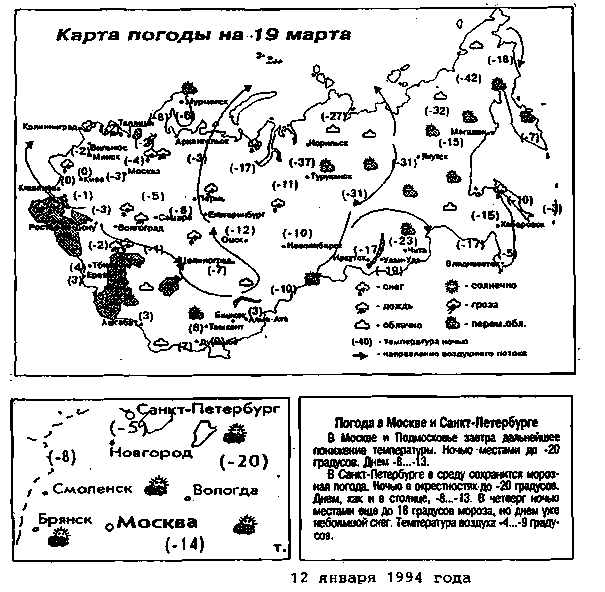
| Россия | Москва - столица России.В России живут русские. |
| Украина | Киев - столица Украины.В Украине живут украинцы. |
| Латвия | Рига - столица Латвии. В Латвии живут латыши. |
| Литва | Вильнюс - столица Литвы.В Литве живут литовцы. |
| Эстония | Таллин - столица Эстонии.В Эстонии живут эстонцы. |
| Молдавия | Кишинёв - столица Молдавии.В Молдавии живут молдаване. |
| Белоруссия | Минск - столица Белоруссии.В Белоруссии живут белорусы. |
| Грузия | Тбилиси - столица Грузии.В Грузии живут грузины. |
| Армения | Ереван - столица Армении.В Армении живут армяне. |
| Азербайджан | Баку - столица Азербайджана.В Азербайджане живут азербайджанцы. |
| Узбекистан | Ташкент - столица Узбекистана.В Узбекистане живут узбеки. |
| Казахстан | Алма-Ата - столица Казахстана. В Казахстане живут казахи. |
| Туркмения | Ашхабад - столица Туркмении.В Туркмении живут туркмены. |
| Таджикистан | Душанбе - столица Таджикистана.В Таджикистане живут таджики. |
| Киргизия | Бишкек - столица Киргизии.В Киргизии живут киргизы. |
Fill in the blanks, orally.
| 1. ____________________ | столица Белоруссии. |
| 2. ____________________ | столица Грузии. |
| 3. ____________________ | столица Киргизии. |
| 4. ____________________ | столица Туркмении. |
| 5. ____________________ | столица Литвы. |
| 6. ____________________ | столица Украины. |
| 7. ____________________ | столица Узбекистана. |
Fill in the blanks, orally.
| 1. В Армении живут | ____________________ |
| 2. В Азербайджане живут | ____________________ |
| 3. В Молдавии живут | ____________________ |
| 4. В Эстонии живут | ____________________ |
| 5. В Таджикистане живут | ____________________ |
| 6. В Казахстане живут | ____________________ |
| 7. В Латвии живут | ____________________ |
Answer the following questions according the models:
| Instructor: | Таджики живут в Таджикистане? |
| Student: | Да, они живут в Таджикистане. |
| Instructor: | Эстонцы живут в Латвии? |
| Student: | Нет, они живут в Эстонии. |
| 1. | Русские живут в России? | ____________________ |
| 2. | Грузины живут в Грузии? | ____________________ |
| 3. | Казахи живут в Казахстане? | ____________________ |
| 4. | Молдаване живут в Белоруссии? | ____________________ |
| 5. | Узбеки живут в Латвии? | ____________________ |
| 6. | Туркмены живут в Киргизии? | ____________________ |
| 7. | Азербайджанцы живут в Литве? | ____________________ |
Of course, as you well know, the Newly Independent States are home to many nationalities. The above exercise, and the ones following, in no way suggest that these new countries have entirely homogeneous populations.
Using the map, indicate the home countries of the given nationalities.
Покажите где живут украинцы.
Покажите где живут узбеки.
Покажите где живут армяне.
Покажите где живут русские.
Покажите где живут белорусы.
Покажите где живут литовцы.
Using the map, indicate the capitals of the following countries:
Покажите столицу Казахстана.
Покажите столицу Молдавии.
Покажите столицу Туркмении.
Покажите столицу Украины.
Покажите столицу России.
Покажите столицу Армении.
Listen to the following statements your instructor will read aloud. Indicate whether they are true (правильно) or false (неправильно):
В Киргизии живут киргизы?
Таджики живут в Таджикистане?
В Узбекистане живут узбеки?
Русские живут в Азербайджане?
В Эстонии живут казахи?
Латыши живут в Латвии?
Match the countries with their capitals.
| Эстония | Ереван |
| Таджикистан | Рига |
| Россия | Минск |
| Казахстан | Тбилиси |
| Литва | Бишкек |
| Грузия | Киев |
| Туркмения | Вильнюс |
| Молдавия | Москва |
| Латвия | Душанбе |
| Узбекистан | Ашхабад |
| Армения | Кишинёв |
| Украина | Таллин |
| Азербайджан | Баку |
| Белоруссия | Алма-ата |
| Киргизия | Ташкент |
Russian is an inflected language which simply means that nouns (and their modifiers) will change their shape to indicate a change of function within the sentence. A noun may function as a subject, an indirect object or direct object or the object of a preposition. In each instance it will change its ending to inform you of its particular role.
Each of these functions is indicated by a set of endings (1 each for each of the genders and 1 for plural), which are grouped into CASES:
| 1. Nominative | names the subject (who? what?) |
| 2. Genitive | shows possession (whose?) |
| 3. Dative | indicates the indirect object, recipient of the action (to whom? to what?) |
| 4. Accusative | indicates the direct object (whom? what?) |
| 5. Instrumental | indicates instrument or means; or accompaniment (how? with what? with whom?) |
| 6. Locative/Prepositional | shows location (where?); indicates the object of the preposition (about whom? about what?) |
All Russian nouns belong to one of three grammatical genders: masculine, neuter or feminine. Do not confuse gender with sex; the word for table in Russian is a masculine gender noun, but there's nothing male about the object; book in Russian is a feminine gender noun, but there's nothing inherently female about it. However, nouns referring to male beings will (usually) be masculine gender; those referring to female beings will be feminine gender.
In most cases, the gender of the noun can be determined by its ending. The table below illustrates this:
| MASCULINE | NEUTER | FEMININE |
| end in a consonant or-b | end in -о or -е | end in -а, -я or -ь |
паспорт автомобиль портфель | озеро море пальто | виза фамилия Сибирь |
| он | оно | она |
Adjectives agree with the nouns they modify in gender, number and case. This means that when a singular feminine noun is in the nominative case (the subject of the sentence), the adjective that describes that noun must be nominative, singular, feminine. Since the noun and adjective do not necessarily stand together in the sentence, agreement is especially important. Agreement in the nominative may look like this:
| OН | ОНО | ОНА |
новый дом хороший студент | новое здание хорошее вино | новая квартира хорошая студентка |
| ОНИ | ОНИ | ОНИ |
новые дома а хорошие студенты | новые здания хорошие вина | новые квартиры хорошие студентки |
Russian uses pronouns in much the same way English does; they take the place of, or refer back to nouns. The table below shows the correspondence between Russian and English pronouns:
| я | I |
| ты | you (sing, and informal) |
| он/она/оно | he/she/it |
| мы | we |
| вы | you (pi. and formal) |
| они | they |
As you can see by this table, Russian has two pronouns for the second person you. Ты is informal and singular; вы is formal and/or plural. (See the comments on ты andвы in Lesson 3).
As in English, Russian pronouns change form as their function changes in the sentence. Take a look at the following sentences:
I know you.
You know me.
I changes to me when it switches from the role of subject to the role of object.
Я знаю вас.
Вы знаете меня.
Вот is used in Russian in the sense of "Here is..." when pointing to something or someone. For example:
| -Где багаж? | Where's the luggage? |
| -Вот он. | Неге it is. |
| -Где Линда? | Where's Linda? |
| -Вот она. | Here she is. |
The verbжить [to live] appears in two forms in this lesson: (он/она) живётand (они) живут. Verbs in Russian, as in English, agree with their subjects in terms of person (I, you, he/she, we, they) and number (He lives, vs They live.). The two forms indicated here are for a singular subject and a plural subject, respectively.
| Он живёт в Москве. | Не lives in Moscow. |
| Она живёт в Киеве. | She lives in Kiev. |
| Они живут в Америке. | They live in America. |
| Кто живёт в Украине? | Who lives in Ukraine? |
| В Украине живут украинцы. | Ukrainians live in Ukraine. |
Here is the verb житьin all forms of the present tense:
| жить / to live | |
| я живу | мы живём |
| ты живёшь | вы живёте |
| он живёт | они живут |
Какой, какое, какая, какие is a question word which asks: «Which?» or «What kind of? ...» It is an adjective and will agree in gender, number and case with the word it modifies. The first three forms shown here are the masculine, neuter and feminine forms, respectively. The fourth is the plural. Compare these forms to those of the adjectives in the table on page 29.
| OH | OHO | ОНА | ОНИ |
| какой | какое | какая | какие |
The nominative case is used to indicate the subject of a sentence. It is also used for other nouns in the sentence which give more information about the subject. As it is the dictionary form for nouns and adjectives, you should memorize nouns and adjectives in their nominative case forms.
| Я иду в театр. | I am going to the theater. |
| Книга на столе. | The book is on the table. |
| Вот дом. | There is the house. |
| Это моя ручка. | This is my pen. |
| Мой брат - инженер. | My brother is an engineer. |
| В институте работают американские физики. | American physicists work in the institute. |
Because Russian has cases, word order in a sentence is less important than it is in English. The subject [that noun plus its modifiers in the nominative case] can come at the beginning, in the middle or at the end of the sentence. Knowing the nominative case endings for nouns and adjectives will help you find the subject of the sentence more quickly.
Adjectives are linked to their nouns by their endings. The adjective may stand in front of, after, or at a distance from the noun it modifies. You can always find the adjective which modifies a noun by looking for the one whose ending matches in gender, number, and case that of the noun.
Это Белый дом.
Она учительница хорошая, опытная.
Русский язык очень интересный, но трудный.
Table 2.1. Useful words and expressions
| в | in, inside |
| восток; на востоке | east; in the east |
| вот | here |
| Где? | Where? |
| город | city, town |
| Добро пожаловать! | Welcome |
жить (я живу, вы живёте, они живут) | to live |
| запад; на западе | west; in the west |
| какой/какое/какая/какие | what kind of; which; which one(s) |
| Кто? | who |
| Кто это? | Who is that? |
| на | on; at; in |
| он, она, оно, они | he; she; it; they |
| Покажите... | Show... |
| погода | weather |
| север; на севере | north; in the north |
| столица | capital |
| что | what |
| Что это? | What is that/this |
| это | this/that |
| юг; на юге | south; in the south |